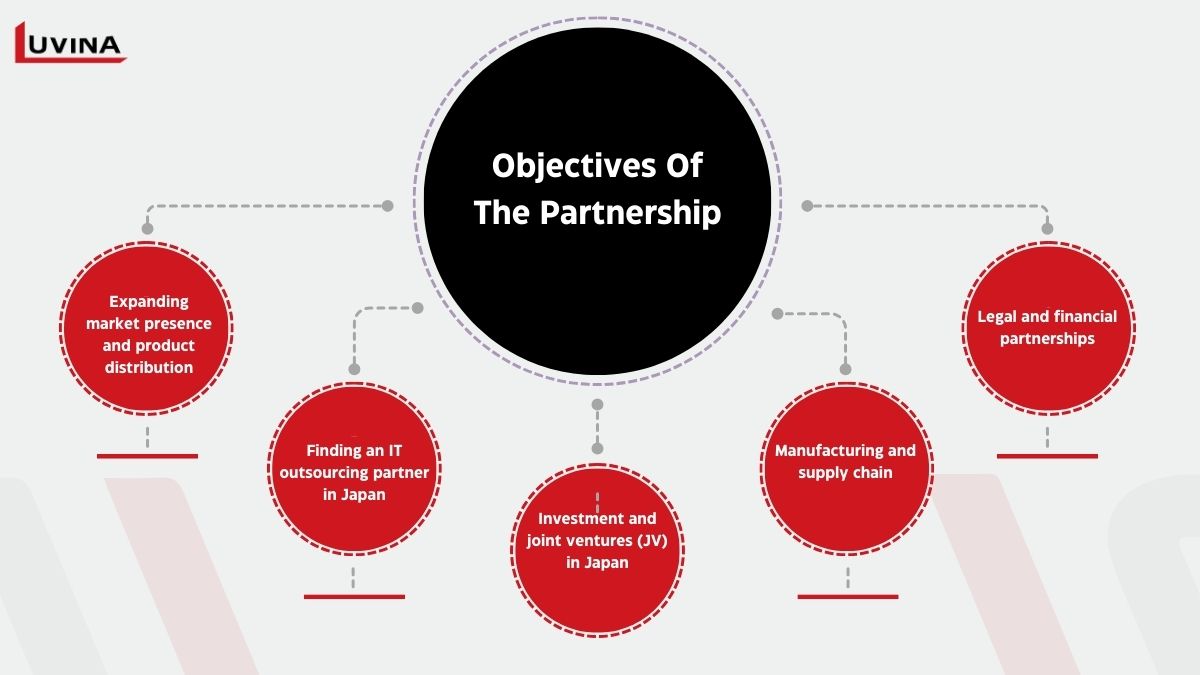Japan is a land of opportunity—and complexity. Expanding into this dynamic market requires more than a strong product. It demands trusted local relationships, cultural fluency, and strategic partnerships. Whether you’re exploring IT outsourcing, entering a joint venture, or scaling your supply chain, choosing the right partner can be the turning point of your success in Japan. This article offers specific strategies for finding your perfect business partner in Japan.
Objectives of the Partnership
Forming strategic partnerships in Japan requires a nuanced understanding of both business goals and cultural protocols.

1. Expanding market presence and product distribution
Japan’s competitive market and advanced consumer base require that companies collaborate with local partners who possess established distribution channels and in-depth knowledge of regional market forces and consumer sentiment. This is especially crucial in sectors where brand image, service quality, and after-sales service are key drivers in customer retention.
When looking for a business partner in Japan, it is necessary to target companies that have a strong local footprint, experience with international product adaptation, and a shared long-term vision. Ideal partners may include trading firms, regional distributors, or niche market specialists with complementary brand portfolios and operational strengths. The selection process must be guided by in-depth market analysis, due diligence, and alignment with business values.
2. Finding an IT outsourcing partner in Japan
Japan’s well-developed IT sector and advanced engineering capabilities make it an attractive—but demanding—market for global tech partnerships. If you’re aiming to find an IT outsourcing partner in Japan, it’s crucial to align your goals with the right kind of partner. When looking for a business partner in Japan, ensure you align your business goals with the kind of domestic partner you want to acquire. Below are the most critical categories of IT partners that you can pursue:
- System integrators (SIers): These are traditional, large-scale corporations such as NTT Data, NEC, and Fujitsu. They have extensive experience dealing with complex, enterprise-level systems and are known for reliability, process-oriented philosophy, and high industry presence in Japan. SIers are well-suited to large-scale, long-term projects that require full-stack integration and strict compliance.
- Small and medium enterprises (SMEs) & startups: These companies tend to offer more flexibility and quicker turnaround times. They are largely inclined to participate in cross-border collaborations and, with it, can bring innovative solutions and fresh ideas to your project. SMEs and startups are typically more appropriate for companies looking for customization, responsiveness, and cost savings in software development or system maintenance.
- Offshore IT vendors and development partners: Mostly found in countries like Vietnam, India, the Philippines these firms collaborate with Japanese companies via offshore development centers or co-development teams. Particularly useful for businesses trying to scale development capacity or lower operating costs without sacrificing quality care.
A case in point of this approach is Luvina Software, a Vietnamese IT company with a major focus on the Japanese market. Luvina has been successfully executing BOT projects for large-scale Japanese clients and offers a complete-cycle transition from initial team setup to full operations transfer. With bilingual engineering talent, strong process governance, and deep cultural understanding, Luvina enables Japanese firms to scale their R&D capacity efficiently while maintaining Japanese quality and communication standards.
Luvina is a reliable choice for foreign companies that want to find IT partners in Japan. Our services range from system modernization and maintenance to end-to-end software development, offering flexibility to adapt to various business needs.
3. Investment and joint ventures (JV) in Japan
Joint ventures (JVs) in Japan are a strategic arrangement by which foreign and domestic companies may combine their capabilities, skills, and resources. Through such an alliance, each partner will be able to leverage its strengths while compensating for any weaknesses, resulting in a more robust business model. For companies that must find a business partner in Japan, a joint venture is an appropriate format, particularly for those who wish to enter the Japanese market or engage in joint ventures with domestic firms.

There are several ways a joint venture can be structured in Japan. One is when both companies decide to work together with each other under an agreement for a limited period but as distinct businesses. This is used most commonly in projects of specified scope or duration. On the other hand, companies can choose to form a separate legal entity for the joint venture. In this case, both sides contribute capital, have stakes in the new venture, and also share management of its operations. This is suitable for long-term joint ventures in which both sides want significant control and involvement in the venture.
For foreign corporations that are interested in penetrating the Japanese market, having a joint venture as a means of finding a partner in Japan can open up local channels of distribution, industry knowledge, and marketing experience. However, success in a joint venture is reliant on planning, a clear role definition of the responsibility of each partner, and dedication to successful work process integration. Respect for the work culture of both partners is also essential for a successful and harmonious partnership.
4. Unlocking Japan’s supply chain potential
When looking for a business partner in Japan, one of the best ways to expand your operations is through supply chain and manufacturing alliances. A manufacturing or supply chain management alliance will allow you to tap into Japan’s robust infrastructure while preserving the quality and efficiency of your products.
In a manufacturing partnership, businesses typically collaborate with local companies to produce goods either through contract manufacturing or joint production facilities. This collaboration allows foreign companies to leverage Japan’s expertise in areas such as electronics, automotive, and precision engineering. Partnering with Japanese manufacturers can also help businesses reduce costs, improve operational efficiency, and navigate local regulations more effectively. Furthermore, Japan’s reputation for high-quality standards can enhance the overall quality of your product.
On the other hand, forming a supply chain partnership in Japan can provide access to a reliable network of suppliers, distributors, and logistics companies. Japan’s supply chain is known for its speed, efficiency, and resilience, making it a crucial part of any business strategy looking to maintain a competitive advantage in global markets. By working with a local supply chain partner, companies can ensure faster delivery times, more consistent inventory management, and better alignment with local market demands.
5. Navigating legal and financial ties with confidence
If you are looking for a business partner in Japan, you must approach potential collaborators and distributors with an eye to their values, processes, and communication styles. Being punctual and well-prepared is crucial. Bring plenty of business cards to swap, as this is a formal and traditional part of relationship-building.

Besides, it’s wise to prepare a detailed presentation about your company, including its background, beliefs, and products. Don’t forget to print copies of your presentation in case electronic facilities do not exist, and prepare some information translated into Japanese to facilitate the communication process.
Tips for Building Partnerships in Japan
Building successful partnerships with business partner in Japan requires careful planning and respect for the country’s unique business culture. Below are key tips to help guide you through this process.
1. Preparation is key
If you are looking for a business partner in Japan, it’s crucial to approach potential distributors and collaborators with respect for their values, processes, and communication style. Arriving on time and being well-prepared are essential. Ensure that you bring plenty of business cards to exchange, as this is a traditional and formal part of relationship-building.
Additionally, it’s advisable to prepare a detailed presentation about your company, including its background, values, and products. Be sure to print copies of your presentation in case electronic facilities are unavailable, and consider having some materials translated into Japanese to facilitate communication.
2. Effective communication and market understanding
Knowing your competitive landscape and articulating your unique selling proposition (USP) is crucial in differentiating your product or service in the Japanese market. Plot your brand visually against competitors to communicate your positioning.
Also, before meeting, take time to research your potential partner company in detail. Study their history, structure, and territorial coverage by checking their website or other publicly accessible data. Having knowledge of their language capabilities and, if necessary, hiring an interpreter can also assist in easier communication.
>> See more: Business Meeting Etiquette in Japan: Key Rules & Tips

3. Setting responsibilities and expectations
Once you find a partner in Japan, contracts with Japanese companies are typically based on clear, formal agreements that outline the terms of the partnership, including sales targets, distribution strategies, and after-sales service responsibilities. It is best to have due diligence performed before any contracts are signed, as it may be challenging to terminate contracts in Japan. Make sure both parties understand each other’s expectations, performance measures, and whatever support they are providing, including marketing or sales representatives.
4. Negotiating prices and understanding market dynamics
Negotiating prices is a key component of establishing a successful partnership in Japan. Study the Japanese market to understand the value of your product or service before negotiating the price. Determine the distributors’, importers’, and exporters’ margins by working backward from the retail price.
Understanding the functions of the supply chain will help determine the margin to be left for each party. Remember also that Japanese companies are averse to price increases and may not transfer hikes to their end-consumers, so realistic prices should be anticipated right from the start.
5. Managing intellectual property (IP)
IP management must be part of your partnership contracts, such as licensing conditions. Japanese business organizations may not always be very concerned about IP protection, so it is important to take the lead in negotiations on this matter. Make sure you have a Non-Disclosure Agreement (NDA) to avoid any confusion later on and ensure your IP assets, such as trademarks, are registered in Japan before opening a shop there.

6. Patience and relationship-building
Patience is key when working with Japanese companies, as decision-making processes are often slower due to the hierarchical structure in many organizations. Building a long-term partnership requires consistent communication and commitment. Regular meetings, both in person and online, are essential to maintaining strong relationships. Be prepared for the decision-making process to take time, and understand that Japanese partners value stability and reliability in their business relationships.
Conclusion
Choosing the right business partner in Japan is a critical decision that can significantly impact the success of your operations in the market. While cultural differences and challenges in communication may arise, with the right preparation and understanding of local business practices, these obstacles can be effectively overcome. By carefully considering your potential partner’s strengths, market expertise, and alignment with your goals, you can establish a strong foundation for a mutually beneficial partnership.
How can Luvina help?
Ready to explore business opportunities in Japan? Partner with Luvina and gain a trusted ally with two decades of Japan-market expertise. Let’s turn your vision into a long-term success.

With the Build-Operate-Transfer (BOT) model, Luvina allows businesses to enter the Japanese market with minimal upfront investment by utilizing Luvina’s established local infrastructure. Luvina takes on the responsibility of setting up and managing operations, from office space and staffing to legal and regulatory compliance. Over time, as your operations stabilize and grow, Luvina gradually transfers full control to your business, ensuring a smooth transition.
This BOT model provides a cost-effective and low-risk method for international companies to establish a presence in Japan, without the financial burden and complexity of starting from scratch. Furthermore, Luvina supports businesses in meeting Japan’s high-quality standards. ensuring compliance with local regulations, and streamlining post-sales support, making it an ideal partner for successful market entry.
Let us help you turn Japan’s complexity into your competitive edge. Contact Luvina today to start your partnership journey.
FAQ
What are the best platforms to connect with Japanese companies?
The best platforms to connect with Japanese companies include trade shows, industry-specific events, LinkedIn, and business networking platforms like JETRO (Japan External Trade Organization) and BizReach. Additionally, leveraging local business incubators and chambers of commerce can provide valuable networking opportunities.
What industries in Japan are open to foreign partnerships?
Industries such as technology, automotive, manufacturing, healthcare, renewable energy, and food & beverage are particularly open to foreign partnerships.
Do I need a Japanese partner to start a business in Japan?
While it’s not mandatory to have a Japanese partner to start a business in Japan, having one can offer significant advantages, such as facilitating cultural integration, understanding local regulations, and enhancing trust with potential clients and distributors.s and help you scale. Contact us today!









Read More From Us?
Sign up for our newsletter
Read More From Us?
Sign up for our newsletter